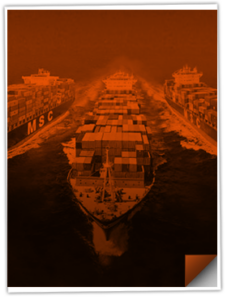Featured Headlines:
US Actions Making a Difference for Ukrainians
FDA Pulls Out The Rug on Drugs
The Global Grab Bag Chronicles
Double Croppin’ and Ex-Im Hoppin’
US Actions Making a Difference for Ukrainians
- In the six months since Russia first invaded Ukraine, the Bureau of Industry and Security (BIS), part of the US Department of Commerce, has taken a slew of actions—in tandem with its allies and partners worldwide—to restrict trade in commodities, technologies, and software; which includes, but is not limited to the following:
- Issued over a dozen regulations imposing expansive export controls, which has resulted in a decrease of 97% by value of U.S. exports of items—including high tech, industrial, and luxury goods—subject to new controls to Russia and Belarus.
- Built a coalition of 37 allies and partners that have implemented similar controls including: Australia, Canada, the European Union (EU), Iceland, Japan, the Republic of Korea, Liechtenstein, New Zealand, Norway, Switzerland, and the United Kingdom (UK).
- Expedited license approvals to support Ukraine’s defense including firearms, ammunition, night vision goggles, and protective equipment such as ballistic helmets, body armor, and other items subject to Commerce’s jurisdiction.
- Prevented over 100 shipments to Russia and Belarus.
- Detained or seized 244 shipments, totaling more than $93 million.
- To learn more about the other actions the US has taken since February, check out the official BIS press release.
ITAR Has Come So Far
- The US Department of State is amending the International Traffic in Arms Regulations (ITAR) to better organize the purposes and definitions of the regulations effective September 6, 2022; the final rule is the first of a multi-year, multi-rule ITAR project.
- As part of the final rule, the Directorate of Defense Trade Controls (DDTC) is moving generally applicable text from the various parts of the ITAR to Part 120.
- To assist the regulated community in locating the ITAR text, DDTC has created a helpful table that identifies all moves, renumbering, revisions, removals, and new text; click here to view the DDTC table.
- Click here to view the official Federal Register Notice (87 FR 16396).
- For more information on ITAR-related news and events, visit the DDTC Directorate.
FDA Pulls Out The Rug on Drugs
- The US Federal Drug Administration (FDA) has posted a report focusing on common entry errors for human drug product entries following the completion of a six-month study.
- Importers can use this report to see common errors that the FDA may be seeing—specifically ones that could potentially delay entry processing.
- FDA also includes explanations on how to address certain errors in the report.
- For more details, please review the Human Drug Common Entry Errors from the FDA.
Trains, Trucks, and Tankers
- As the US and China beat their chests over Taiwan, many trucking and logistics firms anticipate increased trade between Mexico and the US. As such, a big growth in warehousing development is expected in both New Mexico and Texas while several towns will be jockeying to position themselves to process a greater number of trucking crossings. Take a peek at monthly truck crossings by location for July:
- Laredo, Texas: 228,500
- El Paso, Texas: 66,300
- Hidalgo, Texas: 56,100
- Brownsville, Texas: 25,400
- The good news: Three of the 12 rail workers unions have reached a deal with the largest railroads in the US. The tentative deal would deliver 24% pay raises, 22% in base pay, plus bonuses. These three smaller unions represent about 10% of the US rail workforce.
- The bad news: The remaining 90%, including the powerful Brotherhood of Locomotive Engineers and Trainmen and The Sheet Metal Air, Rail, and Transportation unions, continue to express disappointment over staffing levels and better scheduling rules. A deal better get done before September 16, or Uncle Sam will need to get more involved.
- After dropping for six straight weeks, the average cost of diesel fuel is up about 20 cents in the US since early August, settling at $4.91/gallon. Only in The People’s Republic of California is the price still north of $6/gallon.
- A recent industry survey has revealed that dray truckers in the New York/New Jersey (NY/NJ) region would rather drink beer at the beach than make use of Saturday gate hours at local terminals. The truth is that Big Apple port operations are severely hampered by shippers holding onto loaded containers and the chassis upon which they rest. Only 5% of boxes are moved on Saturdays—though local weekend beer sales are up 10%. Hmmm…very interesting…
- Deep breath, gentle readers! For the first time in two $&#*-ing years, drayage at all major US ports can be obtained by pre-booking a week out! Woot—pop that champagne, supply chain nerds! As recently as July, there were still four ports that required 10-14 days’ notice to secure spot drayage; but, as many of you painfully remember, we had a dozen US gateways with two-week dray delays at the apex of the madness in 2021.
The Global Grab Bag Chronicles
- South Korea’s multi-billion-dollar chip business—often viewed as a broad business barometer, bright broskis and babes—faces demand headwinds for the first time since 2019. August shipments were down about 25% with worldwide inventory levels reaching 80% of pre-pandemic levels. Typically, a slump in semi-conductors and chips indicates a dip in big-ticket purchases. And, guess what? Shipments of desk-top computers are at a 30-year low after a continued decline this summer. Would you look at that?!
- Authorities from Russia, Ukraine, and the United Nations have mapped out a merchant haulage route to safely ship grain and fertilizer from Ukraine. This is profoundly good news for what has become a global food inflation crisis. Based on the role that Turkish waters played in this success, we would like to suggest that we all nickname the new shipping route “Turkish Delight.” Pass the word!
- To some extent, as China’s economy goes, so goes the world economy. After weaker performance due to Covid lockdowns, China’s economy roared back to life for two months, but this lion is now all but yawning. Chinese property loans grew at the slowest rate since 2012 in August while power rationing affected factory production potential. With record temperatures and a land-scorching drought, it looks like power conservation and rationing will continue well into September, if not beyond. We wish we were lyin’ about this lion!
- US life expectancy has declined by 2.7 years in the last two years. Phew, finally some good news! The two-year drop is the largest in over 100 years, and it now equals life expectancy levels in 1996.
- Since 2008, the East and Gulf Coast’s share of Asia imports has increased from 25% to a record high of 44% in 2022 YTD. The one-year increase is a rather impressive 5%. Based on the struggles for Savannah and Houston to process vessels fast enough, it will be a compelling story to watch as we head into 2023.
‘Elon’ Maersk Buys It All
- Danish giant, Maersk, has purchased LF Logistics, the logistics arm of the famous (and infamous) contract logistics company Li & Fung. The deal was worth more than $3.6 billion—though the assets in question were valued at $10,000 before the pandemic (just kidding… take it easy!).
- After the acquisition dust settles, Maersk will add 223 warehouses to their line-up and will near 10 million square meters of total storage capacity worldwide. LF also employs 10,000 people in the greater Asia and Indian Subcontinent regions.
- In a real stunner, it was also announced that Maersk, on the strength of dubious and excessive profits since 2020, may also be purchasing Flexport, Expeditor’s, COSCO, CMA CGM, Twitter, Tesla, Honda, Nike, Vatican City, and the United Kingdom (yes, all of it). Sheesh, that is some treasure chest, Maersk!
Air Heads United
- Gang, the title works a lot better if we lead with a United Airlines news item, so here goes: Despite past tensions over government subsidies, we expect United Airlines and Emirates to announce a codeshare partnership within weeks. Essentially, this means that the two airlines will sell tickets/airfreight on each other’s aircraft. Pack your bags, folks! It was 104 degrees in the UAE today with a bone-chilling 87 expected for the overnight low.
- In our on-going battle with mathematics, let’s take a look at the last five weeks of global air cargo activity. First, total airfreight capacity is UP 8%, check. Second, industry-wide chargeable kilos are DOWN 8%, check. Thus, rates are…ARRRGGGHHH…the damn rates are UP 5%! How does that make sense?!
- While all other regions are down in kilos YTD, North America and Latin America are both up about 10% in 2022. None of the other regions were available for comment, but they are all notoriously sore losers (even when playing checkers—yes, we checked).
- Airfreight rates out of China continue to soften with spot rates under $7 per kilogram available from Shanghai and Hong Kong. Space out of Shenzhen is a bit tighter.
- Mark your calendars, China’s Golden Week will be celebrated from October 1-7; you’ll need to book your air cargo by mid-September. Oh, and while we’re on the subject, never ever forget the beautiful, quite ancient story of Golden Week: Waaayyy back in 1999, the Chinese government wanted to spur more domestic tourism spending, and Golden Week was born! Oh golly, please hand us the Kleenex box!
Double Croppin’ and Ex-Im Hoppin’
- After changing insurance rules to mitigate farmers’ risk, the United States Department of Agriculture (USDA) is encouraging American farmers to begin growing two crops on the same land, one right after the other (yes, this is really called “double cropping”).
- Why is the USDA doing this? They want to significantly increase the production of wheat, and double cropping is a fast pathway. In the complex world of global logistics, the US wants to be less dependent on imported wheat while also potentially increasing highly valuable exports of American wheat.
- Would you like a politically charged metaphor? Well, too bad. You can’t compare wheat exports to gun control, women’s rights, any border in any direction, religion, the FBI, Floridian documents, or US obesity rates without offending several million people… and we have that kind of readership and clout and don’t you doubt it, readers!
- On a much more serious note, the US export business in wheat is already worth well over six billion dollars a year; the stakes are quite high indeed.
- A senior Ukrainian official and the head of the US Export-Import Bank (EXIM) have pledged to continue working to finance efforts to support Ukraine’s infrastructure and energy security.
- Check out this quote: EXIM said, “Russia’s actions will not deter EXIM from financing projects in Ukraine… EXIM stands ready to be part of Ukraine’s efforts to rebuild.”
- The signed memorandum of understanding identifies over $3 billion in EXIM financed projects for Ukraine, with a strong emphasis on energy, rail, and road infrastructures.



